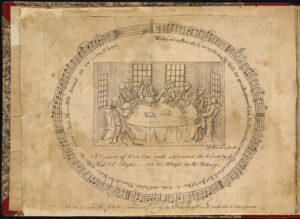William Billings, Methinks I See an Heavn’ly Host

If you are wandering around Boston Commons, you may reach a small cemetery on south side off Boylston Street. (Or maybe you have seen a video of Professor Carol teaching American music from this cemetery.) A plaque next to the gate informs you that the American composer William Billings (1746-1800) is buried in an unmarked grave somewhere within. In this, Billings has something in common with his contemporary Mozart.
We can’t draw very many comparisons between Mozart and Billings. Billings had no formal musical training, and the musical life of the American Colonies and early United States was a far cry from 18th-century Vienna. America lacked a leisure class, an aristocracy, and royal patrons. Billings would become a tanner. He suffered from a variety of physical infirmities and failed to profit from his music. (We will save the history of copyright law for another day.) But Billings has a particular place of honor in American music history. His patriotic anthem “Chester” has been described as the National Anthem of the American Revolution. “Chester” and the round “When Jesus Wept” are deeply embedded in America’s musical memory.
In 1770, Billings published The New-England Psalm-Singer, the first collection of musical works entirely by an American. Paul Revere engraved the cover. Billings’ choral anthems would be spread throughout America in Protestant hymnals and later by the itinerant singing masters spreading shape-note singing in the South and Midwest.
Billings wrote only unaccompanied choral works. The style is rather straightforward and hymn-like, but it included sections of counterpoint that became known as “fuguing tunes.” The “fuguing tunes” featured staggered entrances by the four voices in imitation of one another, but lacked the complex characteristics of the baroque fugue. Methinks I See an Heavn’ly Host does not follow the model of a fuguing tune, but it contains some imitative counterpoint and is typical of Billings’ writings.



